12 Essential AI Courses for Research Scientists in 2025
Explore the top 12 AI courses tailored for research scientists in 2025, covering cutting-edge techniques and tools. Elevate your expertise and stay ahead in the ever-evolving realm of artificial intelligence with these essential learning opportunities.
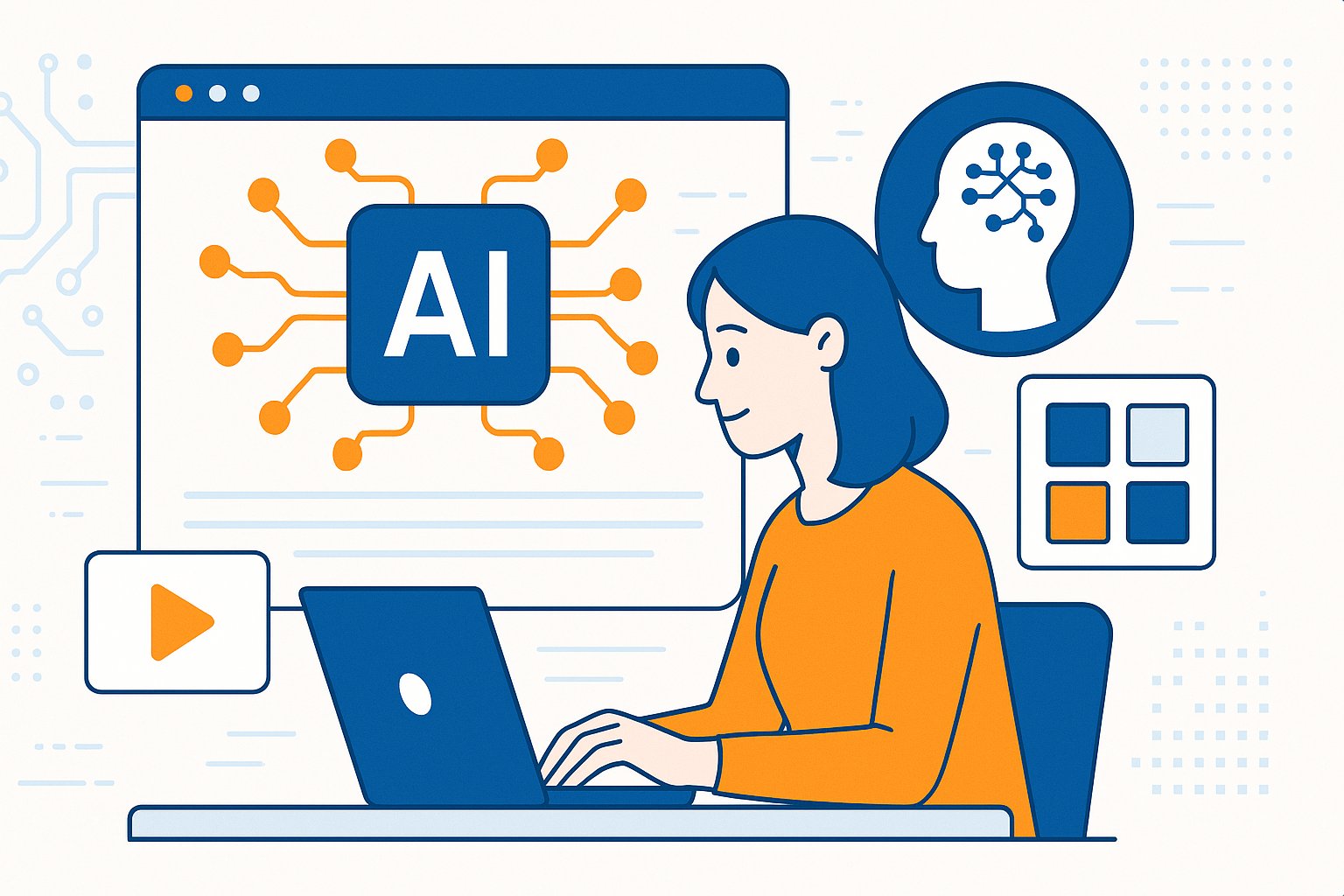
Artificial Intelligence (AI) is transforming industries across the globe, and for Research Scientists, staying current with these advancements is crucial. The rapid development of AI technologies is reshaping traditional methods, offering new tools and methodologies that can significantly enhance research capabilities. As AI continues to evolve, professionals in the research sector are confronted with the pressing need to upskill to maintain their competitive edge and to harness the potential of these technologies effectively. This urgency is not just about keeping pace with technological advancements but also about leveraging AI to address complex scientific problems, streamline processes, and drive innovation. For Research Scientists, understanding AI's implications and applications can be a game-changer in their careers, making the selection of the right AI courses a pivotal decision.
Why AI matters for Research Scientists today
AI's relevance for Research Scientists cannot be overstated. Recent statistics reveal that 69% of businesses have already integrated AI into their operations, underscoring its widespread adoption and the necessity for professionals to become proficient in these technologies. For Research Scientists, AI offers tools to analyze vast amounts of data, automate repetitive tasks, and uncover patterns that may not be visible through traditional methods. This article aims to guide Research Scientists in selecting the most effective AI courses, ensuring they have access to education that will equip them with the necessary skills to excel in their field.
The Growing Role of AI in Research Scientists
AI applications are becoming integral to the work of Research Scientists, influencing a wide array of activities. From automating data collection and analysis to enhancing decision-making processes and personalizing research methodologies, AI is significantly transforming how research is conducted. These technologies enable scientists to handle complex datasets with greater ease, improve the accuracy of their findings, and develop innovative solutions to challenging problems. As AI continues to integrate into research workflows, understanding and utilizing its capabilities becomes essential for professionals seeking to remain at the forefront of their disciplines.
Benefits of becoming an AI expert in Research Scientists
For Research Scientists, gaining expertise in AI offers numerous advantages. It enhances their ability to conduct more efficient and effective research by providing powerful tools for data analysis and interpretation. Additionally, AI proficiency can lead to career advancement opportunities, as organizations increasingly seek individuals who can leverage these technologies to drive innovation and improve outcomes. By becoming skilled in AI, Research Scientists can expand their research capabilities, increase their impact in their field, and contribute more significantly to scientific advancements. This article will compare 12 AI courses, including the highly regarded CompleteAI Training, to assist professionals in making informed decisions about their educational paths.

Comparison: All AI Courses for Research Scientists (Updated Q2' 2025)
| Course Name | Provider | Price | Key Topics | Pros | Cons | Best For |
|---|---|---|---|---|---|---|
| AI for Research Scientists | Complete AI Training | $29/month or $8.25/month billed annually | Specialized video courses and certifications for Research Scientists, AI tools, industry news | Highest rating, extensive course range, daily updates, affordable pricing | Subscription based | General learners |
| IBM AI Foundations for Everyone Specialization | IBM via Coursera | $39-$79/month (subscription, free audit available) | Large Language Modeling, Automation, Data Science, Generative AI, Machine Learning, NLP | Beginner-friendly, comprehensive coverage, self-paced, high ratings | May not cover advanced research topics | General learners |
| 2nd DCSE Summer Course 2025 on AI and Robotics in Society 5.0 | DCSE, Universitas Gadjah Mada | $23 (IDR 350,000); free for first 40 international participants | AI and robotics in Society 5.0, global discussions, academic credits | Expert speakers, interactive discussions, affordable fee | Limited free spots, online format | General learners |
| Introduction to Artificial Intelligence (AI) | IBM via Coursera | $39-$79/month (subscription, free audit available) | Core AI concepts, generative AI, NLP, market opportunities | High rating, beginner-friendly, covers AI basics | May require advanced courses for deeper applications | General learners |
| Generative AI: Prompt Engineering Basics | IBM via Coursera | $39-$79/month (subscription, free audit available) | Prompt engineering, generative AI models, IBM Cloud | High user rating, practical skills | Beginner level, may need complementary courses | General learners |
| AI For Everyone | DeepLearning.AI via Coursera | $39-$79/month (subscription, free audit available) | Data ethics, AI/ML concepts, strategic thinking | Very high rating, broad coverage | Non-technical, less coding focus | General learners |
| IBM AI Developer Professional Certificate | IBM via Coursera | $39-$79/month (subscription) | Prompt engineering, software development, machine learning, Python | Extensive curriculum, hands-on projects | Intermediate level, time commitment required | General learners |
| Fundamentals of Machine Learning and Artificial Intelligence | Amazon Web Services via Coursera | $39-$79/month (subscription, free audit available) | AI and ML concepts, AWS SageMaker, deep learning | Free access, practical AWS tools | Mixed beginner/intermediate level | General learners |
| Machine Learning Specialization | DeepLearning.AI via Coursera | $39-$79/month (subscription) | Supervised and unsupervised learning, deep learning, Python | Very high rating, comprehensive specialization | Requires programming and math background | General learners |
| Introduction to AI | Google via Coursera | $39-$79/month (subscription, free audit available) | AI fundamentals, generative AI, critical thinking | Excellent rating, Google-backed content | Introductory level, may need follow-ups | General learners |
| IBM AI Engineering Professional Certificate | IBM via Coursera | $39-$79/month (subscription) | Prompt engineering, PyTorch, Keras, reinforcement learning | Comprehensive, hands-on | Requires prior programming and AI knowledge | General learners |
| AI For Business Specialization | University of Pennsylvania via Coursera | $39-$79/month (subscription) | AI applications in business, data ethics, governance | High rating, business-oriented insights | Less technical, more strategic focus | General learners |
Understanding AI Training for Research Scientists Professionals
AI has become an essential part of modern research, offering innovative tools and methodologies that empower research scientists to conduct cutting-edge studies. With a plethora of AI courses available, choosing the right one can be vital for professional growth and development. This article provides a detailed comparison of various AI courses tailored for research scientists, highlighting their unique features, advantages, and areas for improvement.
Course 1: CompleteAI Training
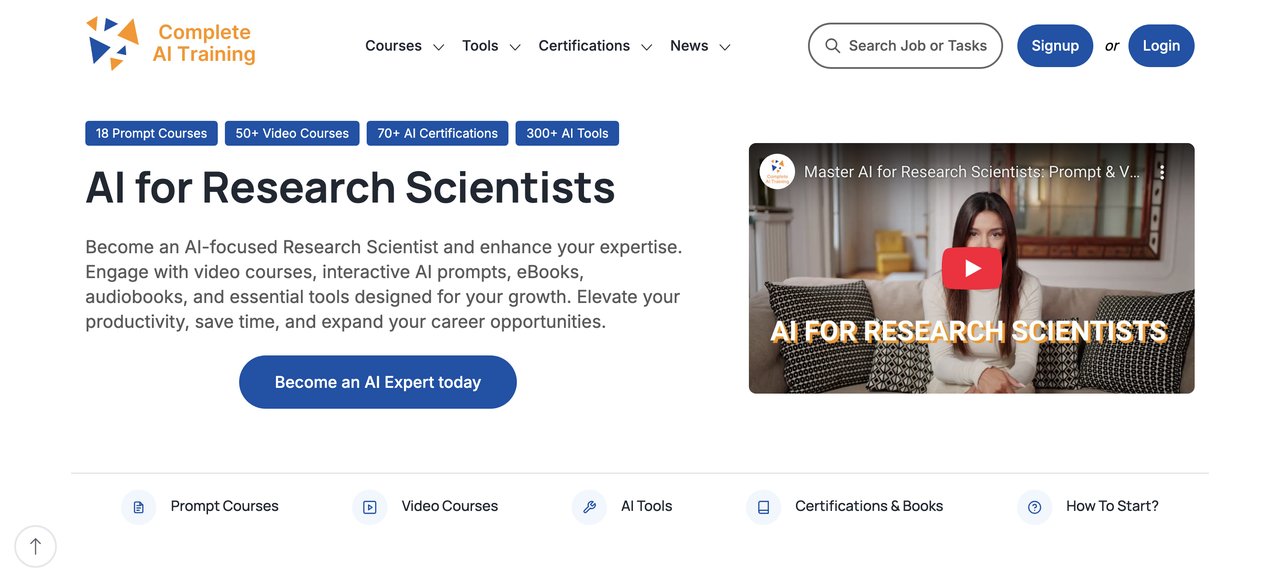
CompleteAI Training offers a comprehensive suite of over 100 video courses and certifications specifically designed for research scientists. This platform provides subscribers with an extensive AI education, daily updates on the latest AI tools, and industry news pertinent to research scientists.
Key Topics Covered: Specialized AI courses and certifications, updates on AI tools and news.
Target Audience and Skill Level: Suitable for research scientists looking for in-depth AI knowledge.
- Pros:
- Highest rating and most complete offering.
- Extensive range of AI courses and certifications tailored for research scientists.
- Daily updates on relevant AI tools and news.
- Affordable pricing, especially with annual billing.
- Cons:
- Subscription-based, requiring continuous engagement for ongoing learning.
Who Would Benefit Most: Research scientists seeking a broad and deep understanding of AI with regular updates.
Course 2: IBM AI Foundations for Everyone Specialization
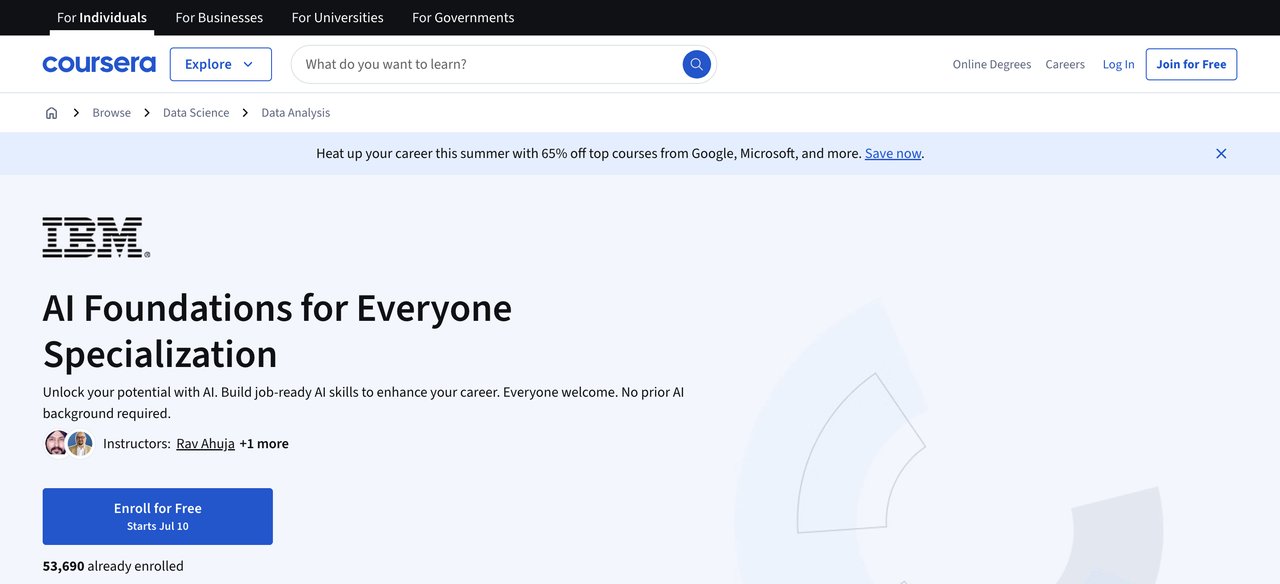
IBM AI Foundations for Everyone Specialization is a beginner-level course that introduces AI concepts to newcomers. This specialization covers various foundational topics essential for building job-ready AI skills, including large language modeling, automation, data science, and more.
Key Topics Covered: Large Language Modeling, Automation, Data Science, Machine Learning, Deep Learning, NLP.
Target Audience and Skill Level: Suitable for beginners with no prior AI experience, including research scientists new to AI.
- Pros:
- Beginner-friendly with no prior AI experience needed.
- Comprehensive coverage of foundational AI topics.
- Self-paced learning with a certificate upon completion.
- High learner ratings (4.7/5 from 4,069 ratings).
- Cons:
- May not cover highly advanced or specialized research topics in depth.
Who Would Benefit Most: Research scientists at the beginning of their AI journey seeking foundational knowledge.
Course 3: 2nd DCSE Summer Course 2025 on AI and Robotics in Society 5.0
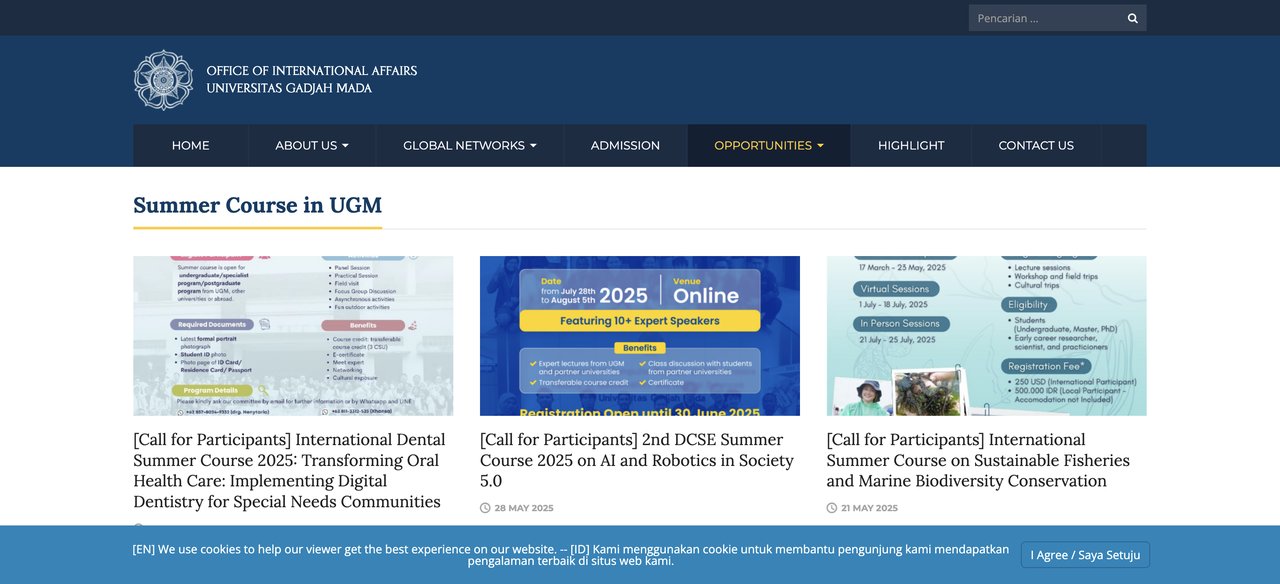
2nd DCSE Summer Course 2025 offers an international online experience focusing on AI and robotics' role in creating a human-centered Society 5.0. The course features expert lectures and interactive discussions with global participants.
Key Topics Covered: AI and robotics in societal development, global discussions, and expert lectures.
Target Audience and Skill Level: Designed for research scientists interested in emerging AI technologies and their societal impacts.
- Pros:
- Expert speakers from UGM and partner universities.
- Interactive global discussions with participants.
- Transferable academic credits and a certificate of participation.
- Affordable fee with free slots for early international registrants.
- Cons:
- Limited free spots (only for the first 40 international participants).
- Online format may limit hands-on experience for some participants.
Who Would Benefit Most: Research scientists interested in the societal implications of AI and robotics.
Course 4: Introduction to Artificial Intelligence (AI) by IBM

Introduction to Artificial Intelligence (AI) by IBM is a beginner-level course that covers core AI concepts, including generative AI and natural language processing. It's designed to help learners understand how AI systems solve problems and recognize patterns.
Key Topics Covered: Generative AI, natural language processing, and AI problem-solving.
Target Audience and Skill Level: Suitable for beginners, including research scientists new to AI.
- Pros:
- High rating (4.7/5).
- Beginner-friendly course.
- Covers generative AI and ChatGPT basics.
- Cons:
- May require further advanced courses for deeper research applications.
Who Would Benefit Most: Research scientists seeking an introduction to AI concepts and applications.
Course 5: Generative AI: Prompt Engineering Basics by IBM
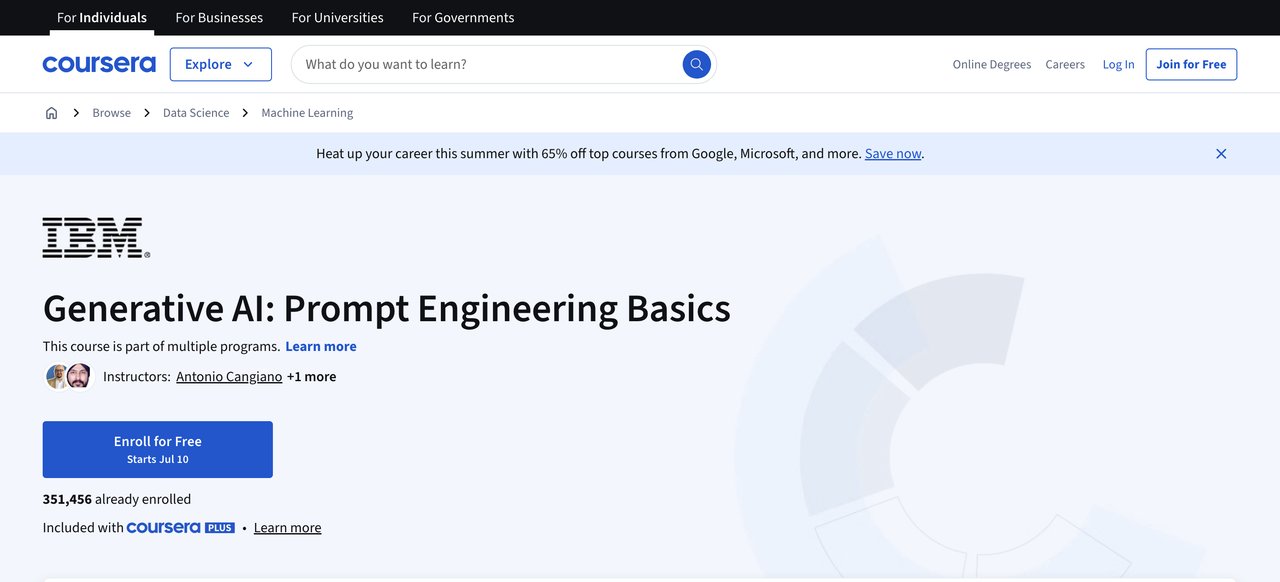
Generative AI: Prompt Engineering Basics focuses on essential skills for prompt engineering in generative AI models. This course covers large language modeling and IBM Cloud integration.
Key Topics Covered: Prompt engineering, large language modeling, IBM Cloud integration.
Target Audience and Skill Level: Suitable for beginners, particularly research scientists working with generative AI models.
- Pros:
- High user rating (4.8/5).
- Practical skills in prompt engineering.
- Cons:
- Beginner level, may need complementary advanced AI courses.
Who Would Benefit Most: Research scientists interested in practical skills for generative AI models.
Course 6: AI For Everyone by DeepLearning.AI
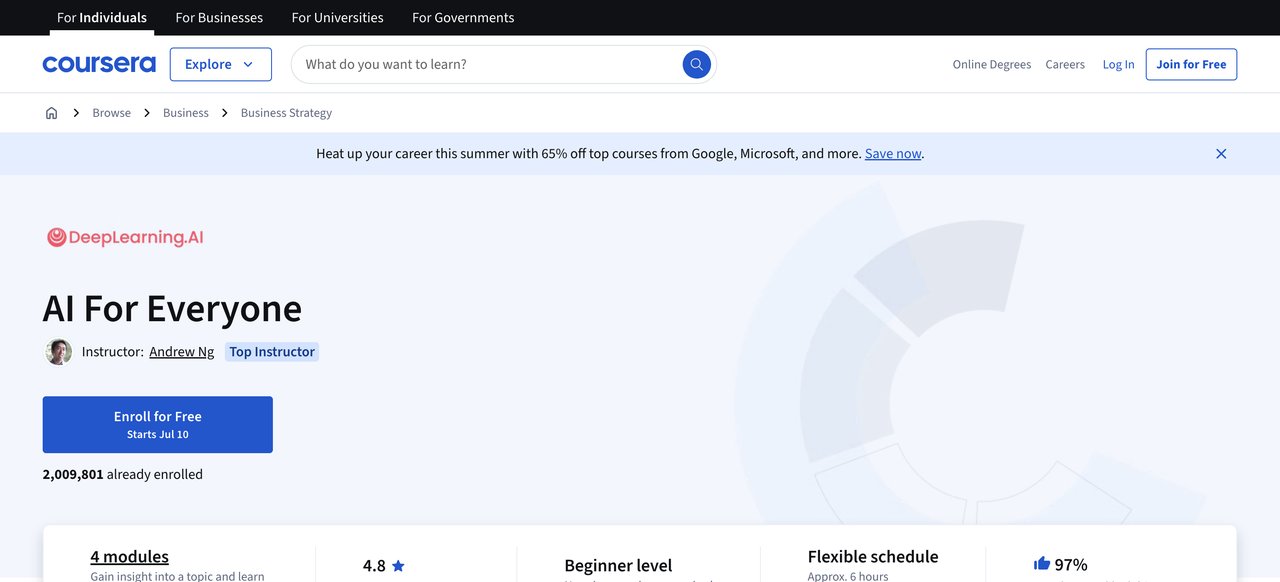
AI For Everyone provides a non-technical introduction to AI, exploring data ethics, AI/ML concepts, and strategic thinking. It's suitable for researchers seeking a broad understanding of AI's impact across industries.
Key Topics Covered: Data ethics, AI/ML concepts, strategic thinking.
Target Audience and Skill Level: Suitable for non-technical audiences, including research scientists interested in AI's broader impact.
- Pros:
- Very high rating (4.8/5).
- Broad coverage including ethics and business applications.
- Cons:
- Non-technical, less focused on coding or algorithmic depth.
Who Would Benefit Most: Research scientists looking for a broad overview of AI without a technical focus.
Course 7: IBM AI Developer Professional Certificate
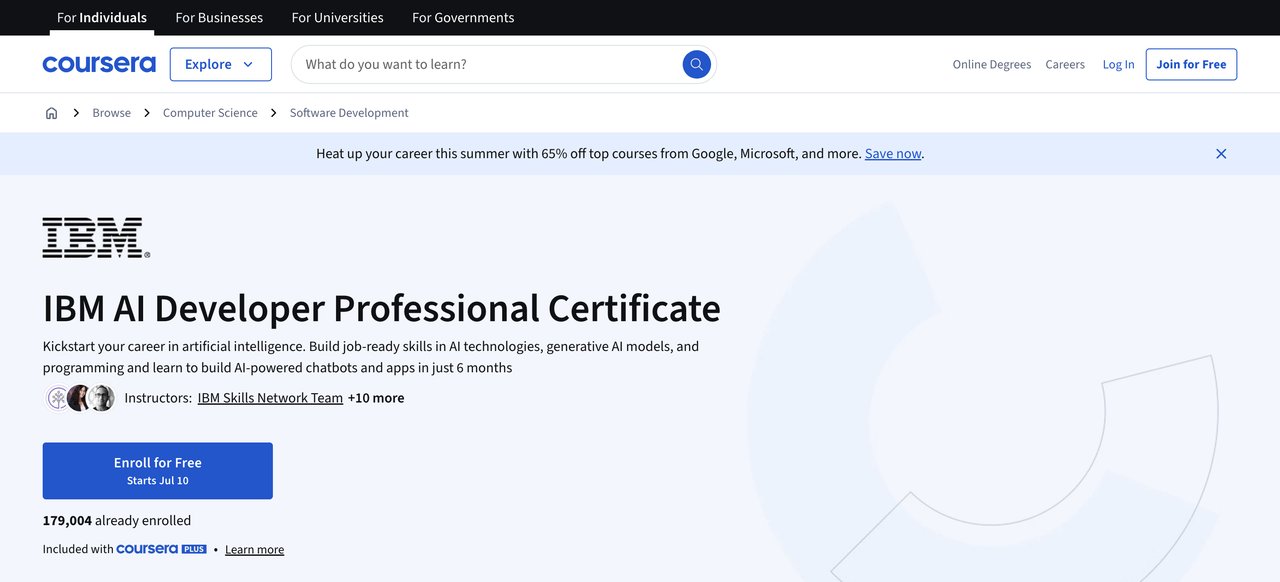
IBM AI Developer Professional Certificate offers a comprehensive curriculum covering prompt engineering, the software development lifecycle, large language models, and machine learning. Ideal for research scientists aiming to build and deploy AI applications.
Key Topics Covered: Prompt engineering, software development lifecycle, large language models, machine learning.
Target Audience and Skill Level: Intermediate level, suitable for those with some prior AI knowledge.
- Pros:
- Extensive curriculum with hands-on projects.
- Highly rated (4.6/5).
- Cons:
- Requires time commitment and prior experience.
Who Would Benefit Most: Research scientists interested in developing AI applications and gaining hands-on experience.
Course 8: Fundamentals of Machine Learning and Artificial Intelligence by AWS
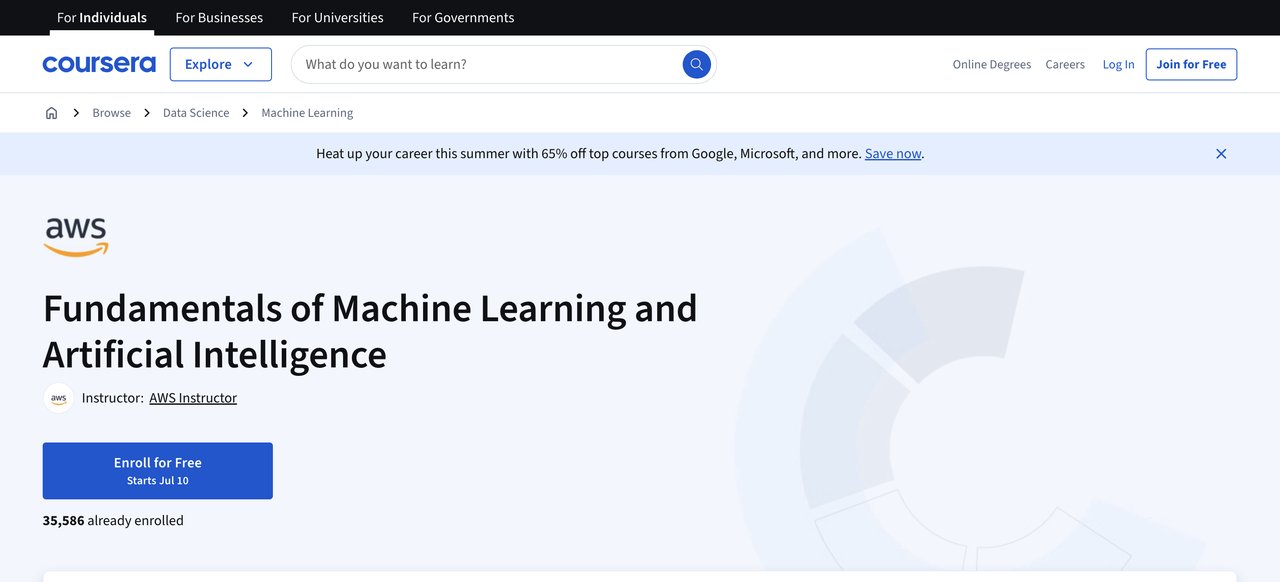
Fundamentals of Machine Learning and Artificial Intelligence by AWS focuses on foundational AI and machine learning concepts. It includes AWS SageMaker and applied machine learning techniques.
Key Topics Covered: AWS SageMaker, deep learning, applied machine learning techniques.
Target Audience and Skill Level: Mixed beginner/intermediate level.
- Pros:
- Free access (audit available).
- Practical AWS tools integration.
- Good rating (4.5/5).
- Cons:
- Mixed skill levels may require additional learning for beginners.
Who Would Benefit Most: Research scientists interested in cloud-based AI solutions.
Course 9: Machine Learning Specialization by DeepLearning.AI
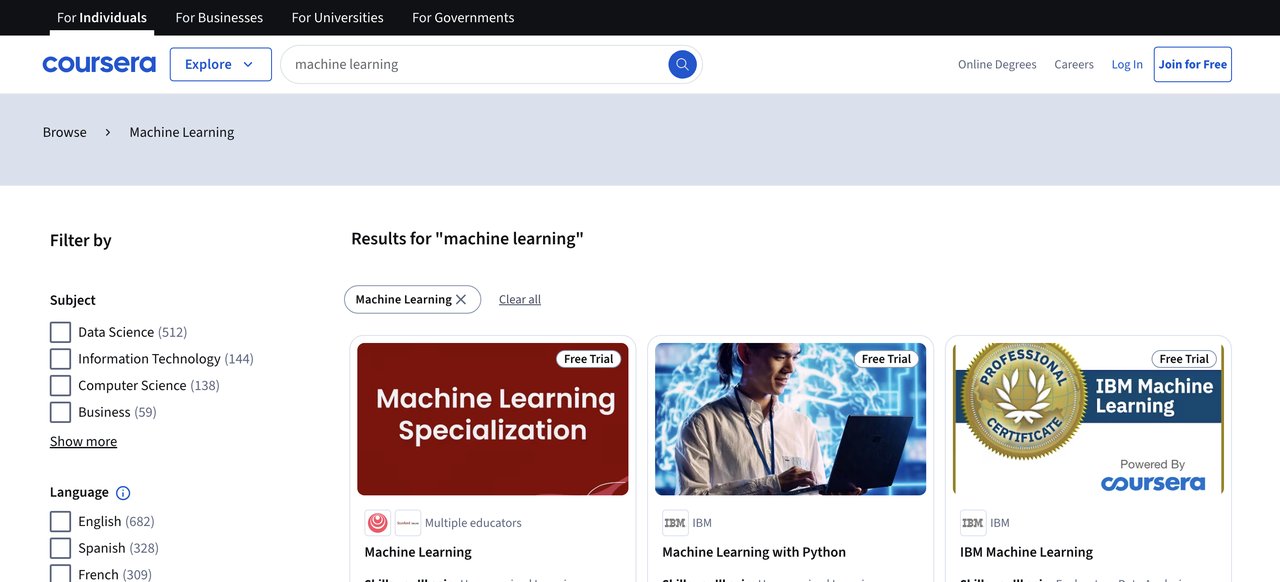
Machine Learning Specialization covers supervised and unsupervised learning, deep learning, and reinforcement learning. This specialization is highly suitable for research scientists seeking in-depth ML knowledge.
Key Topics Covered: Supervised and unsupervised learning, deep learning, reinforcement learning.
Target Audience and Skill Level: Requires some programming and math background.
- Pros:
- Very high rating (4.9/5).
- Comprehensive specialization with a practical coding focus.
- Cons:
- Requires some programming and math background.
Who Would Benefit Most: Research scientists seeking advanced machine learning skills.
Course 10: Introduction to AI by Google

Introduction to AI by Google is a beginner-friendly course that covers AI fundamentals, including generative AI and machine learning software.
Key Topics Covered: AI fundamentals, generative AI, machine learning software.
Target Audience and Skill Level: Suitable for beginners exploring AI concepts.
- Pros:
- Excellent rating (4.9/5).
- Google-backed content.
- Cons:
- Introductory level, may need advanced follow-ups.
Who Would Benefit Most: Research scientists new to AI concepts.
Course 11: IBM AI Engineering Professional Certificate
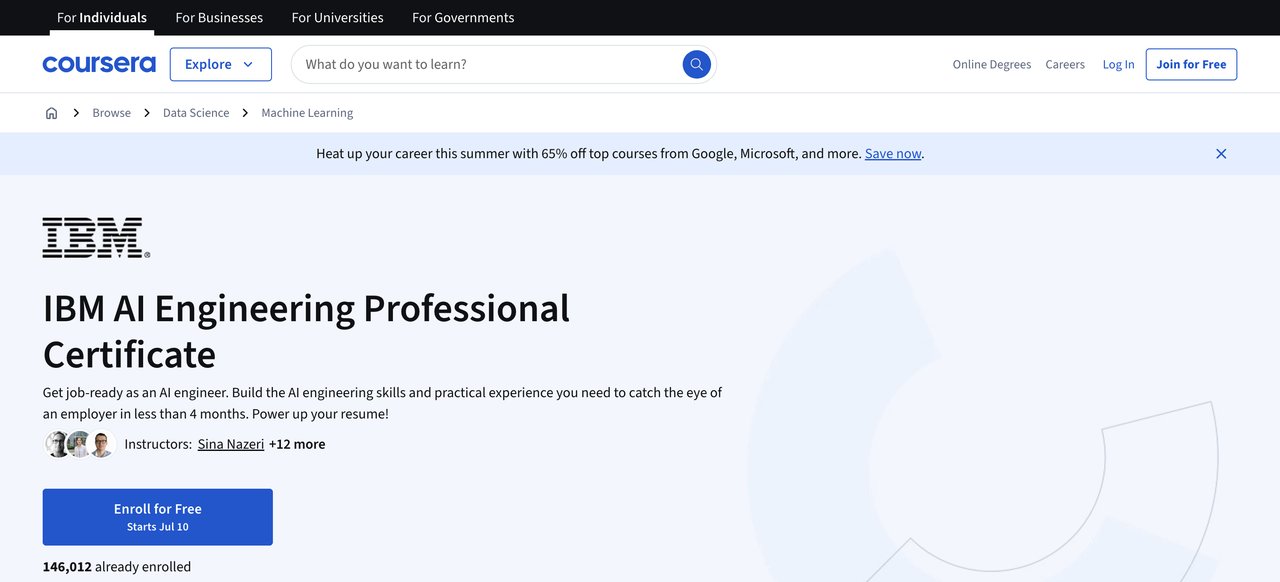
IBM AI Engineering Professional Certificate focuses on prompt engineering, PyTorch, Keras, and reinforcement learning. It's designed for research scientists who want to engineer AI solutions.
Key Topics Covered: Prompt engineering, PyTorch, Keras, reinforcement learning.
Target Audience and Skill Level: Intermediate to advanced, requires prior programming and AI knowledge.
- Pros:
- Comprehensive, hands-on learning.
- Highly rated (4.6/5).
- Cons:
- Requires prior programming and AI knowledge.
Who Would Benefit Most: Research scientists aiming to engineer advanced AI solutions.
Course 12: AI For Business Specialization by University of Pennsylvania
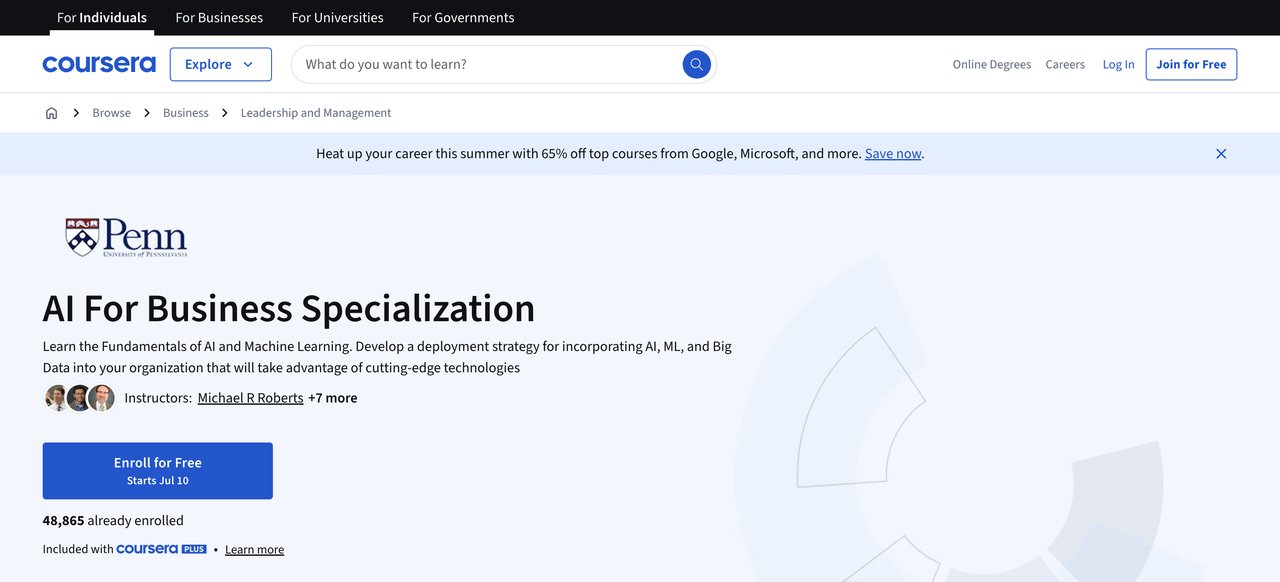
AI For Business Specialization focuses on AI applications in business contexts, such as data ethics and strategic decision-making. It's useful for research scientists interested in AI's business impact.
Key Topics Covered: Data ethics, AI personalization, governance, strategic decision-making.
Target Audience and Skill Level: Business-oriented, less technical focus.
- Pros:
- High rating (4.7/5).
- Business-oriented AI insights.
- Cons:
- Less technical, more focused on strategy and business.
Who Would Benefit Most: Research scientists interested in the strategic and business applications of AI.
Overall Recommendations
For research scientists looking for extensive and continuous AI education, CompleteAI Training offers the most comprehensive package with its broad range of courses and regular updates. Beginners might prefer the IBM AI Foundations for Everyone Specialization or Introduction to Artificial Intelligence by IBM for foundational knowledge. Those interested in practical applications should consider the IBM AI Developer Professional Certificate for hands-on experience. Each course provides unique benefits, making it essential for individuals to assess their specific needs and career goals when selecting a course.




